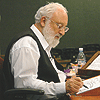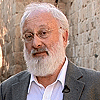 A question I received: I searched the Internet for criticism of you – I just couldn’t hold myself back because I’m constantly having doubts and so I search for criticism to check whether I’m on the right path or not. I found that many people accuse you of not telling your students to observe the commandments. This is clear – you’ve answered this question a hundred times.
A question I received: I searched the Internet for criticism of you – I just couldn’t hold myself back because I’m constantly having doubts and so I search for criticism to check whether I’m on the right path or not. I found that many people accuse you of not telling your students to observe the commandments. This is clear – you’ve answered this question a hundred times.
What’s strange is that many people also accuse you of the opposite – of forcing your students in Bnei Baruch to observe the commandments. I found stories about you kicking people out of the group because they talked on the phone on Saturday, and other such things. (I also noticed that you don’t write on the blog on Saturdays). Is it true that your students in Bnei Baruch have to observe the commandments? If yes, then why do you tell other people that they don’t have to observe them if it’s not their custom? And if it’s false, then did people just make these things up out of nowhere?
My Answer: Anyone who finds out about me will either love me or hate me. People who have a point in the heart are happy to find out about Kabbalah, and they see me as a Rav (meaning “great” in Hebrew). And if they don’t have a point in the heart, then they don’t understand me.
I teach authentic Kabbalah, and I received my knowledge of it through personal study with Rabash. No one else received this knowledge. It’s a known fact that I was Rabash’s unique student. I teach based on my personal attainment of the Upper World and the Creator. My opponents can accuse me of anything they want to, but they can’t say that I don’t understand the subject. In this regard, I haven’t found anyone equal to me so far. Let them listen to my lessons and they’ll be convinced of this.
Usually everything comes down to the question “Is Laitman for or against the commandments?” But this has nothing to do with Kabbalah! (See Baal HaSulam’s article “The Essence of Religion and Its Purpose.”) Laitman is “for” all the cultural traditions of his people, and he believes that it’s better to follow them. However, no one can be forced to do them. Laitman also believes that every person in the world can observe the traditions of his people if he wants to. Baal HaSulam writes that a person can keep his religion while studying Kabbalah and uniting with the Creator, because religions are no more than frameworks for corporeal, national traditions, and they bear no relation to the Creator and to spirituality, the Upper World. Religion borrowed these notions from Kabbalah.
The entire Torah and Kabbalah come down to observing the condition, “Love thy neighbor as thyself.” This is the general, all-enveloping and main Commandment of the Torah – the law of the universe, because it’s the Creator’s property. Kabbalah evokes the Upper Light of correction on a person, which endows him with the property of “love thy neighbor.” Religion, on the other hand, does not do this, and therefore instead of correcting man (which is what the Creator demands), it tells him to study and observe corporeal rituals and limitations.
In the Bnei Baruch center, where 300 men study with me on a regular basis, we abide by the traditional statute of the Kabbalists – observance of the main commandments (such as wearing a skullcap, keeping the Sabbath, observing Kashrut, getting married under a Huppah, and so on). We don’t allow alcoholism or drugs (not even if someone wants to “smoke a joint” in private on occasion). We require daily lesson attendance, participation in the group’s unification, dissemination responsibilities, and so on. And I have never concealed any of this – for example, I always wear a skullcap.
The entire problem of my critics is that they are still underdeveloped, that is to say, their point in the heart hasn’t surfaced yet. They’ll understand when they grow up. It’s impossible to understand spirituality through reason, but only through a desire that’s mature and ready. My critics don’t criticize the actual content, the things Kabbalah actually talks about, but rather they pick on everything “around” it, all the external aspects, the things they can grab hold of in order to snatch something for their egoism – like Klipa. This is their food, because they don’t have anything of their own to nourish them – they are empty. I understand their nature, and I’m willing to tolerate them and forgive them. Time goes by, and it favors the revelation of authentic Kabbalah. Eventually everything will come together in peace and correction.
Related Material:
Laitman.com Post: Life Goes On and It’s In Our Favor
Laitman.com Post: Why Does a Kabbalist Wear a Skullcap?
Laitman.com Post: Everyone’s Place Is in Union With the Creator, and You Don’t Have to Follow Religious Observances to Get There
Laitman.com Post: What Is Religion?
Baal HaSulam article: The Essence of Religion and Its Purpose
Filed under: Spirituality - 1 Comment →
 A question I received: Do we have a memory (Reshimo) of freedom? I think we have to have it, because otherwise how do you explain the fact that we are always searching for freedom? So, assuming that we have this Reshimo, then the Light also fills us, but we just don’t feel or remember it. And one’s aspiration for spirituality is also determined by the Reshimot, isn’t it? This yearning for spirituality and freedom can’t just appear in us out of nowhere, and this means that we have Reshimot of something that once filled us. So my conclusion is that the entire problem is with us – how to awaken our Reshimot , how to wake up from the dream?
A question I received: Do we have a memory (Reshimo) of freedom? I think we have to have it, because otherwise how do you explain the fact that we are always searching for freedom? So, assuming that we have this Reshimo, then the Light also fills us, but we just don’t feel or remember it. And one’s aspiration for spirituality is also determined by the Reshimot, isn’t it? This yearning for spirituality and freedom can’t just appear in us out of nowhere, and this means that we have Reshimot of something that once filled us. So my conclusion is that the entire problem is with us – how to awaken our Reshimot , how to wake up from the dream?







